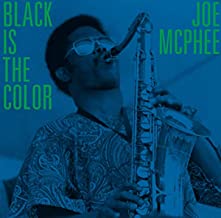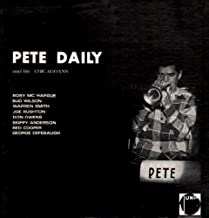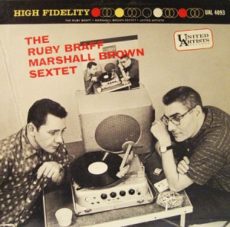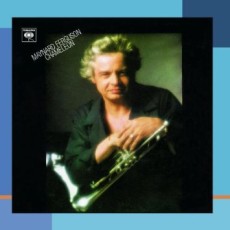
Daily Dose Of Jazz…
Joe McPhee was born November 3, 1939 in Miami, Florida and grew up in Poughkeepsie, New York. He began playing trumpet when he was eight, before learning other instruments. He played in various high school and then military bands before starting his recording career. His first recording came in 1967 when he appeared on the Clifford Thornton album titled Freedom and Unity.
McPhee taught himself saxophone at the age of 32 after experiencing the music of John Coltrane, Albert Ayler, and Ornette Coleman. During the late 1960s and early 1970s, he lectured on jazz music at Vassar College.
In 1975, Werner Uehlinger started the Swiss label Hathut Records with the specific intent of showcasing McPhee’s music. In the 1980s, he met Pauline Oliveros, began studying her musical theories, and worked with her Deep Listening Band.
Not having been signed with any major label in his native United States, Joe was better known throughout Europe until the 1990s. His 1996 album As Serious As Your Life, which takes its title from the jazz book by Val Wilmer, has been said to arguably be the finest of his solo recordings, according to the AllMusic review.
He has recorded or performed with Ken Vandermark, Peter Brötzmann, Evan Parker, Mats Gustafsson, Jeb Bishop, The Thing, Clifton Hyde, Jérôme Bourdellon, Raymond Boni, and Joe Giardullo. Since 1998, he, Dominic Duval, and Jay Rosen have performed and recorded as Trio X. In the 1990s Dominique Eade and McPhee had a jazz ensemble called Naima.
He has written reviews and commentary for Cadence magazine and was awarded the Resounding Vision Award by Nameless Sound. Multi-instrumentalist Joe McPhee, who plays tenor, alto, and soprano saxophone, trumpet, flugelhorn and valve trombone, is most notable for his free jazz work done from the late 1960s to the present day.
More Posts: bandleader,flugelhorn,history,instrumental,jazz,music,saxophone,trumpet,valve trombone

Daily Dose Of Jazz…
Pete Daily was born on May 5, 1911 in Portland, Indiana. He started his career in Chicago, Illinois in 1930 playing with various bands in and around the city. He was the leader of Pete Daily and his Chicagoans in the 1940s and 50s and recorded for Capitol Records as Dixie by Daily and Pete Daily’s Dixieland Band. They also recorded on the Jump and Decca labels in the 1950s.
In 1942, he moved to the West Coast and, after service in World War II, formed the Chicagoans. He played long engagements at several Hollywood night clubs in the 1950s such as Sardis, The Royal Room, and the Astors in Studio City. He continued to play during the 1970s until a stroke in 1979 forced him to retire.
During the filming of Pete Kelly’s Blues, actor Jack Webb, the cornet-playing star of the film, repeatedly went to the nightclub where Daily performed to study his mannerisms for his role in the film. The band which recorded the soundtrack appeared at Dixieland festivals supported by Pete Daily’s band.
His driving style on the cornet endeared him to generations of Dixieland Jazz enthusiasts. Cornetist and valve trombonist Pete Daily, who played swing and dixieland, passed away on August 23, 1981.
More Posts: bandleader,cornet,history,instrumental,jazz,music,valve trombone

Daily Dose Of Jazz…
Marshall Brown was born on December 21, 1920 in Framingham, Massachusetts. Little recorded, he devoted most of his career to education, earning a music degree from New York University, as a member of the Zeta Psi Fraternity.
He was also a high school band director leading the Farmingdale New York Daler Band from the early 1950s through 1957. Brown was the first high school band director to initiate a jazz education program, which he did in his tenure at Farmingdale High. By 1956 his stage band, the Daler Dance Band, a jazz big band with an average age of 14 years old, was so formidable and impressive, boasted future jazz stars pianist Michael Abene, saxophonist Andrew Marsala, and whiz drummer Larry Ramsden. One night at the 1957 Newport Jazz Festival, Count Basie, who was late for his appearance as he entered the festival grounds heard the Daler Band performing their set and exclaimed, “Damn, they started already”, mistaking the Dalers for his band.
Marshall received some attention for performing and recording in a quartet with Pee Wee Russell in the early 1960s. While Russell was most often associated with Dixieland or swing, their quartet performed more adventurous, free jazz-oriented pieces, including pieces by Ornette Coleman and John Coltrane.
During the Sixties he was the resident trombonist at Jimmy Ryan’s, a noted dixieland venue. He also club dated with Luke O’Malley’s Irish band during this time. Brown also performed or recorded at one time or another with Ruby Braff, Beaver Harris, Lee Konitz, George Wein and Basie.
Conductor, arranger and educator Marshall Brown, who also played the valve trombone, trumpet, euphonium, electric bass and the banjo, passed away on December 13, 1983 in New York City.
![]()
More Posts: banjo,bass,euphonium,trombone,trumpet,valve trombone

Daily Dose Of Jazz…
Maynard Ferguson was born Walter Maynard Ferguson on May 4, 1928 in Verdun, Quebec, Canada. Encouraged by his musician parents he was playing piano and by the age of four. A child prodigy violinist, at nine he heard a cornet and ask for one. By thirteen, he was heard soloing regularly with the Canadian Broadcasting Corporation Orchestra, featured on “Serenade for Trumpet in Jazz, and won a scholarship to the Conservatoire de Musique du Quebec a Montreal where he studied from 1943 through 1948.
Dropping out of Montreal High School at 15 to pursue his music career ore actively, Ferguson began playing in various dance bands and then took over his saxophonist brother Percy’s band. He played around Montreal and became an opening act for touring bands. This brought him to the attention of many bandleaders in the U.S. and he started getting offers to cross the border.
Maynard eventually relocated to the United States in 1948, intent on joining Stan Kenton’s organization. However, it had just disbanded so he started playing with Boyd Raeburn, Jimmy Dorsey and Charlie Barnet’s bands. When Barnet retired he went to work with Stan Kenton’s newly formed 40-piece Innovations Orchestra in 1950. For three years running, 1950, 1951, and 1952, he won the Down Beat Readers’ Poll as best trumpeter. In 1953, become a session player for Paramount Pictures, soon becoming the first-call player and appeared on 46 soundtracks, and to get around the studio contract that prevented him from playing jazz clubs he would appear under aliases Tiger Brown, Foxy Corby and others.
By 1956, Ferguson became the leader of the Birdland Dream Band, a 14-piece all-star big band formed by Birdland’s owner Morris Levy. He has played with Slide Hampton, Don Ellis, Don Sebesky, John Bunch, Joe Zawinul, Joe Farrell, Jaki Byard, Nino Tempo and others as well as arrangers Bob Brookmeyer, Jimmy Guiffre, Bill Holman and Marty Paich to name a few.
He went on to guest with the New York Philharmonic, then moved to the Hitchcock estate with Timothy Leary, Ram Dass and their Harvard community in 1963 and experimented with LSD, psilocybin and other psychedelic drugs for spiritual awakening. After three years he moved to India, engaged with a guru and established the Sri Sathya Sai Institute of Higher Learning Boys Brass Band and taught for several years.
By 1969, Maynard was in England, signed with CBS Records, formed a big band with British musicians and performed on television then returned to debut his new band in New York. He would recruit young talent from jazz programs from institutions like Berklee College of Music, North Texas State University and the University of Miami and targeting young audiences.
For the next couple of decades he would play the Olympics, work with large ensembles, formed the Big Bop Nouveau, backed vocalists such as Diane Schuur and Michael Feinstein, performed, toured and recorded big band albums. Ferguson has been an influence in the worlds of big band, swing, bebop, cool jazz, Latin, jazz-rock, fusion classical and opera. As an educator he has conducted scores of master classes with amateurs and professional trumpeters over the course of his career. In addition to trumpet he plays the flugelhorn, valve trombone, baritone horn and French horn.
He has been inducted into the Down Beat Jazz Hall of Fame, is a member of Kappa Kappa Psi, honorary member of Phi Mu Alpha’s Xi Chi Chapter, received Phi Mu Alpha Sinfonia Charles E. Lutton man of Music Award, has an honorary doctorate from and The Maynard Ferguson Institute of Jazz Studies at Rowan University, and his extensive memorabilia is housed at the Sherman Jazz Museum in Texas. He passed away on August 23, 2006 at age 78 in Ventura, California.
More Posts: flugelhorn,saxophone,trumpet,valve trombone




